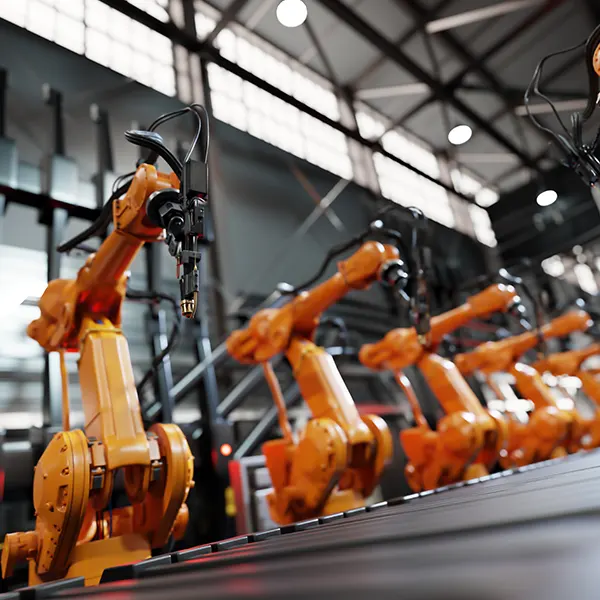
Automated QA testing runs alongside the software development lifecycle and includes the stages below:
 Warehouse Management
Warehouse ManagementA WMS comprises processes and software to manage business inventories and supply chain fulfilment operations. Warehouse management software allows businesses to respond quickly to fulfilment needs in today’s omni-channel and dynamic economy
 Transportation Management
Transportation ManagementOften part of a more extensive supply chain management system, a TMS leverages technologies that help businesses streamline the shipping process. It includes transportation solutions that enable shippers to automate freight movement, saving time, reducing costs, and improving efficiency.
 Order Management
Order ManagementOne of the biggest challenges e-commerce platforms face is receiving, tracking, and fulfilling orders across multiple sales channels. OMS solutions simplify order and inventory management, sales tracking, and fulfilment across all points of sale, including physical stores and online platforms.
 Manufacturing Execution
Manufacturing ExecutionMES are software solutions that provide visibility into the manufacturing process. These solutions ensure the systematic and proactive enforcement of quality and e ciency by connecting manufacturing activities across distributed facilities. It offers real-time quality checks, traceability, and yield monitoring for higher productivity and optimal performance.

Automation in logistics mitigates manual errors that often lead to delayed shipping, damaged products, and wrong deliveries.

Automation technologies allow access to information that can be used to run reports, conduct analyses, and make better business decisions.

Automation technologies ensure 24/7 and instant front-line customer services ranging from real-time tracking to complaint resolution.

Automation technologies are scalable, reduce human labour, and enhance operational speed.

By employing multiple logistic process automation systems such as MES, WMS, TMS, and OMS, companies can integrate the entire supply chain. It leads to reduced overall costs and increased productivity.
Internet of Things (IoT) and big data solutions such as sensors, beacons, GPS, data analytics, management, and visualisation tools allow efficient asset management. Drone-based deliveries, automated inventory, and vehicle and people tracking are some of the most successful applications of IoT in logistics.
The use of artificial intelligence (AI) in supply chain operations is forecasted to reach a valuation of US$ 14.3 billion by 2028. The widespread applications of AI in logistics include chatbots, demand forecasting, automated shipment scheduling, and tracking. Along with AI, Robotic Process Automation (RPA) can automate everyday back-end operations such as scheduling deliveries, tracking, updating customer information, etc.
Automated invoice data capturing such as Optical Character Recognition (OCR) can help logistics firms scale by eliminating manual data extraction procedures. Machine learning-powered data capture technologies save time and money while enabling scalability.
Cloud-based tools are another blessing to the logistics industry. For instance, cloud software integrates automation into the supply chain by checking errors in automated tasks through one-click authorisations and reminders. Moreover, cloud solutions provide reliable data backup and allow inventory and supply tracking across multiple operation sites.
| Cookie | Duration | Description |
|---|---|---|
| __cf_bm | 1 hour | This cookie, set by Cloudflare, is used to support Cloudflare Bot Management. |
| _cfuvid | session | Calendly sets this cookie to track users across sessions to optimize user experience by maintaining session consistency and providing personalized services |
| cookielawinfo-checkbox-advertisement | 1 year | Set by the GDPR Cookie Consent plugin, this cookie records the user consent for the cookies in the "Advertisement" category. |
| cookielawinfo-checkbox-analytics | 11 months | This cookie is set by GDPR Cookie Consent plugin. The cookie is used to store the user consent for the cookies in the category "Analytics". |
| cookielawinfo-checkbox-functional | 11 months | The cookie is set by GDPR cookie consent to record the user consent for the cookies in the category "Functional". |
| cookielawinfo-checkbox-necessary | 11 months | This cookie is set by GDPR Cookie Consent plugin. The cookies is used to store the user consent for the cookies in the category "Necessary". |
| cookielawinfo-checkbox-others | 11 months | This cookie is set by GDPR Cookie Consent plugin. The cookie is used to store the user consent for the cookies in the category "Other. |
| cookielawinfo-checkbox-performance | 11 months | This cookie is set by GDPR Cookie Consent plugin. The cookie is used to store the user consent for the cookies in the category "Performance". |
| CookieLawInfoConsent | 1 year | CookieYes sets this cookie to record the default button state of the corresponding category and the status of CCPA. It works only in coordination with the primary cookie. |
| viewed_cookie_policy | 11 months | The cookie is set by the GDPR Cookie Consent plugin and is used to store whether or not user has consented to the use of cookies. It does not store any personal data. |
| wpEmojiSettingsSupports | session | WordPress sets this cookie when a user interacts with emojis on a WordPress site. It helps determine if the user's browser can display emojis properly. |
| Cookie | Duration | Description |
|---|---|---|
| li_gc | 6 months | Linkedin set this cookie for storing visitor's consent regarding using cookies for non-essential purposes. |
| lidc | 1 day | LinkedIn sets the lidc cookie to facilitate data center selection. |
| wp-wpml_current_language | session | WordPress multilingual plugin sets this cookie to store the current language/language settings. |
| yt-remote-cast-installed | session | The yt-remote-cast-installed cookie is used to store the user's video player preferences using embedded YouTube video. |
| yt-remote-connected-devices | never | YouTube sets this cookie to store the user's video preferences using embedded YouTube videos. |
| yt-remote-device-id | never | YouTube sets this cookie to store the user's video preferences using embedded YouTube videos. |
| yt-remote-fast-check-period | session | The yt-remote-fast-check-period cookie is used by YouTube to store the user's video player preferences for embedded YouTube videos. |
| yt-remote-session-app | session | The yt-remote-session-app cookie is used by YouTube to store user preferences and information about the interface of the embedded YouTube video player. |
| yt-remote-session-name | session | The yt-remote-session-name cookie is used by YouTube to store the user's video player preferences using embedded YouTube video. |
| ytidb::LAST_RESULT_ENTRY_KEY | never | The cookie ytidb::LAST_RESULT_ENTRY_KEY is used by YouTube to store the last search result entry that was clicked by the user. This information is used to improve the user experience by providing more relevant search results in the future. |
| Cookie | Duration | Description |
|---|---|---|
| _ga | 1 year 1 month 4 days | Google Analytics sets this cookie to calculate visitor, session and campaign data and track site usage for the site's analytics report. The cookie stores information anonymously and assigns a randomly generated number to recognise unique visitors. |
| _ga_* | 1 year 1 month 4 days | Google Analytics sets this cookie to store and count page views. |
| _gcl_au | 3 months | Google Tag Manager sets the cookie to experiment advertisement efficiency of websites using their services. |
| _li_id | 2 year | Leadinfo places two cookies that only provides Eastern Enterprise insights into the behaviour on the website. These cookies will not be shared with other parties. |
| Cookie | Duration | Description |
|---|---|---|
| bcookie | 1 year | LinkedIn sets this cookie from LinkedIn share buttons and ad tags to recognize browser IDs. |
| guest_id | 1 year 1 month | Twitter sets this cookie to identify and track the website visitor. It registers if a user is signed in to the Twitter platform and collects information about ad preferences. |
| test_cookie | 15 minutes | doubleclick.net sets this cookie to determine if the user's browser supports cookies. |
| VISITOR_INFO1_LIVE | 6 months | YouTube sets this cookie to measure bandwidth, determining whether the user gets the new or old player interface. |
| VISITOR_PRIVACY_METADATA | 6 months | YouTube sets this cookie to store the user's cookie consent state for the current domain. |
| YSC | session | Youtube sets this cookie to track the views of embedded videos on Youtube pages. |
| yt.innertube::nextId | never | YouTube sets this cookie to register a unique ID to store data on what videos from YouTube the user has seen. |
| yt.innertube::requests | never | YouTube sets this cookie to register a unique ID to store data on what videos from YouTube the user has seen. |
| Cookie | Duration | Description |
|---|---|---|
| __Secure-ROLLOUT_TOKEN | 6 months | Description is currently not available. |

